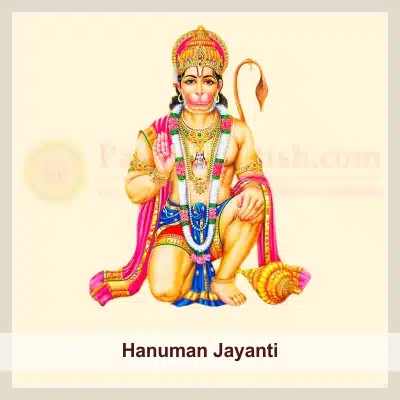About Hanuman Jayanti
Published On : April 9, 2025 | Author : Astrologer Pt Umesh Chandra Pant
Hanuman Jayanti: Rituals, Importance, and How Devotees Celebrate Lord Hanuman’s Birth
Devotees across India and around the world celebrate Hanuman Jayanti, one of the most sacred Hindu festivals, with deep reverence and enthusiasm. This day marks the birth of Lord Hanuman, the powerful monkey god and a devoted follower of Lord Rama. Devotees celebrate Hanuman Janmotsav on the full moon day (Purnima) of the Chaitra month, according to the Hindu lunar calendar. This day usually falls in March or April.
This festival is not only a celebration of Hanuman’s divine birth but also a reminder of the ideals he symbolizes — devotion, loyalty, strength, humility, and service.
Spiritual Significance of Hanuman Jayanti (Hanuman Janmotsav)
Lord Hanuman Jayanti holds immense religious and spiritual importance. Devotees revere Lord Hanuman as the embodiment of selfless devotion, immense strength, and unshakable faith. People worship him not only for his divine powers but also for the values he upheld throughout his life — dedication, courage, and unwavering service to righteousness.
On this day, devotees reflect on his life and teachings and try to implement his qualities in their everyday actions. The festival is a call to cultivate inner strength, discipline, and humility, much like Lord Hanuman.
Celebrations and Rituals on Hanuman Jayanti (Hanuman Janmotsav)
The celebration of Hanuman Janmotsav varies slightly across regions, but the essence remains the same — deep devotion and gratitude. Here’s how devotees across India typically observe this special day:
Temple Visits: From early morning, devotees flock to Hanuman temples. Many temples are specially decorated, and elaborate pujas (rituals) are performed.
Fasting and Prayers: Devotees observe fasts and spend the day in spiritual activities. Some follow a complete fast, while others may take fruits or milk.
Hanuman Chalisa Recitation:
Devotees repeatedly recite the Hanuman Chalisa, a 40-verse hymn that glorifies Hanuman. This chanting fosters strength, courage, and protection from negativity.
Special Bhajans and Kirtans:
Temples and community centers organize devotional music sessions and Sankirtans. These spiritual gatherings fill the atmosphere with uplifting energy and positive vibrations.
Distribution of Prasad:
Devotees distribute offerings such as boondi, laddoos, bananas, and jaggery as prasad after the rituals.
In cities like Varanasi, Nashik, and Delhi, large Hanuman processions take place. People chant slogans, sing bhajans, and perform Ramayana-inspired dance dramas during these vibrant celebrations.
The Divine Birth and Story of Lord Hanuman
The mythology surrounding Lord Hanuman’s birth is both fascinating and spiritually enriching. According to Hindu scriptures, Hanuman was born to Anjana, a celestial nymph cursed to take a monkey form, and Kesari, a brave Vanara chieftain. The Wind God, Vayu, is believed to have played a role in his birth, and is therefore considered Hanuman’s spiritual father.
Hanuman’s journey truly begins when he meets Lord Rama, the seventh avatar of Lord Vishnu. Enchanted by Rama’s divine aura, Hanuman becomes his most faithful servant and plays a central role in the epic Ramayana. His fearless leap across the ocean to find Sita, setting Lanka ablaze, and bringing the Sanjeevani herb to save Lakshmana are just a few examples of his heroic deeds.
Hanuman is revered as a protector, healer, and destroyer of evil forces. His tales of bravery and humility continue to inspire millions of devotees across generations.
Why Devotees Worship Lord Hanuman
Devotees worship Lord Hanuman for many reasons, all tied to his role as a powerful guardian deity. They turn to him to remove obstacles, overcome fears, and gain mental and physical strength. People especially seek his blessings during difficult times, when they need protection from negative energies or wish to grow spiritually.
In astrology, Lord Hanuman plays an important role in remedies for planetary afflictions, particularly those related to Mars (Mangal) dosha. Astrologers often advise people to worship Hanuman on Tuesdays and Saturdays to reduce harmful planetary effects.
Hanuman Jayanti and Its Contemporary Relevance
In today’s fast-paced and often stressful life, the message of Hanuman Jayanti remains more relevant than ever. The festival serves as a spiritual anchor — reminding us to stay grounded, disciplined, and faithful. Lord Hanuman’s example teaches us that with true devotion and inner strength, any difficulty can be overcome.
Hanuman Jayanti is not just about rituals; it is about reviving our connection with higher virtues and divine consciousness. It invites people of all ages to participate in acts of service, humility, and compassion.
Hanuman Jayanti is a sacred opportunity for devotees to reflect on the timeless values that Lord Hanuman represents. Millions gather to worship this divine protector, chanting ‘Jai Bajrangbali’ and praying for courage, wisdom, and strength.
Let this Hanuman Janmotsav inspire you to walk the path of righteousness, serve others selflessly, and stay fearless in the face of life’s challenges — just like the mighty Hanuman.
Hanuman Jayanti 2025
We extend our heartfelt wishes to all devotees on the auspicious occasion of Hanuman Jayanti, which will be observed on Saturday, April 12, 2025.
Purnima Tithi Begins: 03:21 AM on April 12, 2025
Purnima Tithi Ends: 05:51 AM on April 13, 2025
May Lord Hanuman bless everyone with strength, wisdom, and devotion. Let us come together in reverence to celebrate the divine birth of Shri Hanuman Ji with prayers and devotion.








